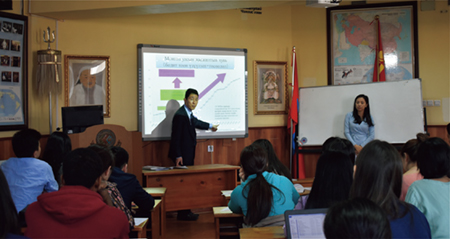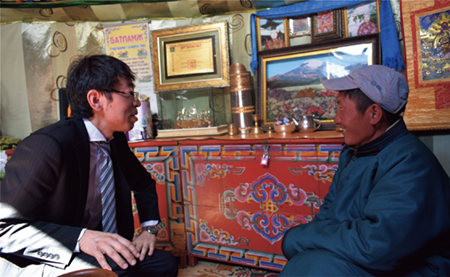Stories from the Field 06
Establishing a Pension System in Preparation for an Aging Society
– “SINRAI Project” in Mongolia
A growing proportion of elderly people is a phenomenon that is proceeding even in developing countries. Mongolia is no exception. Today, one in 25 Mongolians is age 65 or older, for a population-aging rate*1 of about 4%. Fifty years later, however, one in five Mongolians is expected to be age 65 or older. Given the vital need of developing a social security system to address this aging trend, Mongolia requires the know-how of Japan's social security system created in preparation for an aging society, of which central initiatives are the National Health Insurance and the National Pension System for the whole nation. As a result, a technical cooperation project was launched at the end of May 2016 in cooperation with Mongolia's Ministry of Social Welfare and Labor and Social Insurance General Office in order to strengthen the country's capacity for social insurance operation.
“Our goal is to provide 'reliable' social insurance services to Mongolian people and to disseminate correct knowledge, the benefits and importance of a pension system,” says Mr. Mamoru Yamashita, Chief Advisor who named SINRAI*2 Project. He works alongside Mr. Akihiro Takanashi, an expert in social insurance systems with practical experience, and Ms. Erika Kikuchi, an expert in administrative coordination, together with local staff to implement the project.
Mongolia used to be a socialist state until 1992, which had had a pension system since 1942 for all workers, who had received a flat-rate pension after retirement. Later, however, the pension system was reformed following the country's democratization. As a result, compulsory enrollment was established for employees, while voluntary enrollment was set up for the informal sector,*3 such as the self-employed and the nomadic people. Ms. Kikuchi explains that the system today faces problems including a low enrollment rate among people in the informal sector and a lack of basic understanding about the pension system. The Nomadic people account for 10% of the total population of about 3 million, and most of them are not enrolled into the national pension (the enrollment rate of 20%). It is concerned that “non-pensioners” will be the major social problem in the future.

Chief Advisor Mr. Yamashita gives a presentation at the National University of Mongolia about the importance of social insurance. (Photo: JICA)

Mr. Takanashi visits a nomadic household to tell the importance of enrolling in the national pension system. (Photo: JICA)
Ms. Kikuchi, who believes, “A pension is supposed to protect the vulnerable,” has organized 22 seminars to convey the benefits and importance of enrolling into a pension to a broad audience. These seminars have been held at the National University of Mongolia, Rotary Clubs, and unions of the self-employed and civic lectures and so on. Many people who attended these seminars indicated in feedback that they were able to understand the meaning of social insurance for the first time. Also, people who have read articles of interviews with Mr. Takanashi and Mr. Yamashita by local media, or viewed their Facebook posts, have requested the seminar be held at their own organizations, which indicates there is a growing interest in the national pension system among the Mongolians. Meanwhile, one of the operational issues pointed out by Mr. Takanashi was the customer service of the Social Insurance General Office. Staff members were in a situation where “they did not even pay attention to the customer service,” as they were being unfriendly or did not serve the customers for whom they were not responsible, even though these customers were waiting in line. Within this context, short-term experts were invited from Japan to introduce basic customer service training. As a result, Mr. Takanashi sees a difference in the behavior of the service providers as they now serves all customers.
In addition, training for managers and service leaders was also implemented. By sharing practical work experiences with a Japanese pension office, more and more managers and service leaders have realized problems in the current situation and requested additional training or ways to improve inefficiencies at work.
Currently, Mongolians can receive their pension starting from the age of 60 for men and the age of 55 for women. Mr. Yamashita, who felt this reception age was too early for Mongolia, given its future growth, kept proposing that the minimum pensionable age should be increased to 65. As a result, Mongolia plans to raise this age to 65 gradually from 2018. The sustainable operation of the pension system requires people who are able to predict right sums of payouts and premiums based on the future population and plan correctly following forecasts of expenditures and income. Japan needs to support Mongolia through the development of capable human resources so that Mongolians can be responsible for their own pension system in the future.
The SINRAI Project is expected to help Mongolia prepare for an aging society in the future, and to deepen relationship between Japan and Mongolia.
*1 A population-aging rate of greater than 7% is known as an “aging society,” greater than 14% as an “aged society” and greater than 21% as a “super-aged society.” Japan became an aging society in 1970, an aged society in 1995 and a super-aged society in 2010. Japan's population-aging rate stood at 27.3% as of 2016, the highest in the world.
*2 SHINRAI means “reliability” in Japanese.
*3 The informal sector is an economic category not included in the national statistics or records of developing countries because these economic activities are not carried out under government supervision.
<< Previous Page Next Page >>
Main Text | Statistics and Reference Materials | Stories from the Field | Master Techniques from Japan to the World | ODA Topics
